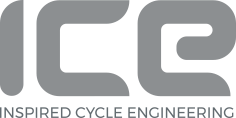

Inspired Cycle Engineering

Cornwall, United Kingdom
April 2024
Machinery & equipment
Manufacturing
United Kingdom
Inspired Cycle Engineering (ICE) is a pioneering force in the world of recumbent trikes. Founded on a passion for innovation and a commitment to redefining the cycling experience, ICE has been at the forefront of developing cutting-edge, high-performance recumbent trikes since 1998. We are an Employee-Owned business, working together to create a business that benefits all; we're here to support our riders every step of the way. At ICE, we are on a mission to revolutionise the way people think about cycling. We believe that everyone should have access to a comfortable, efficient, and enjoyable riding experience, regardless of age or ability. Our trikes are meticulously designed to offer superior comfort, stability, and performance, empowering riders to explore the world around them with confidence and joy. The heart of ICE's success is our unwavering dedication to innovation and quality craftsmanship. Our team of engineers and designers are constantly pushing the boundaries of what is possible, using the latest technology and design principles to create trikes that are not only incredibly fun to ride but also incredibly practical and reliable. At ICE, we're more than just a company – we're a community of passionate cyclists who share a love for adventure and exploration.
Overall B Impact Score
Governance 17.8
Governance evaluates a company's overall mission, engagement around its social/environmental impact, ethics, and transparency. This section also evaluates the ability of a company to protect their mission and formally consider stakeholders in decision making through their corporate structure (e.g. benefit corporation) or corporate governing documents.
What is this? A company with an Impact Business Model is intentionally designed to create a specific positive outcome for one of its stakeholders - such as workers, community, environment, or customers.
Workers 62.6
Workers evaluates a company’s contributions to its employees’ financial security, health & safety, wellness, career development, and engagement & satisfaction. In addition, this section recognizes business models designed to benefit workers, such as companies that are at least 40% owned by non-executive employees and those that have workforce development programs to support individuals with barriers to employment.
What is this? A company with an Impact Business Model is intentionally designed to create a specific positive outcome for one of its stakeholders - such as workers, community, environment, or customers.
Community 13.7
Community evaluates a company’s engagement with and impact on the communities in which it operates, hires from, and sources from. Topics include diversity, equity & inclusion, economic impact, civic engagement, charitable giving, and supply chain management. In addition, this section recognizes business models that are designed to address specific community-oriented problems, such as poverty alleviation through fair trade sourcing or distribution via microenterprises, producer cooperative models, locally focused economic development, and formal charitable giving commitments.
Environment 7.4
Environment evaluates a company’s overall environmental management practices as well as its impact on the air, climate, water, land, and biodiversity. This includes the direct impact of a company’s operations and, when applicable its supply chain and distribution channels. This section also recognizes companies with environmentally innovative production processes and those that sell products or services that have a positive environmental impact. Some examples might include products and services that create renewable energy, reduce consumption or waste, conserve land or wildlife, provide less toxic alternatives to the market, or educate people about environmental problems.
Customers 12.5
Customers evaluates a company’s stewardship of its customers through the quality of its products and services, ethical marketing, data privacy and security, and feedback channels. In addition, this section recognizes products or services that are designed to address a particular social problem for or through its customers, such as health or educational products, arts & media products, serving underserved customers/clients, and services that improve the social impact of other businesses or organizations.
What is this? A company with an Impact Business Model is intentionally designed to create a specific positive outcome for one of its stakeholders - such as workers, community, environment, or customers.